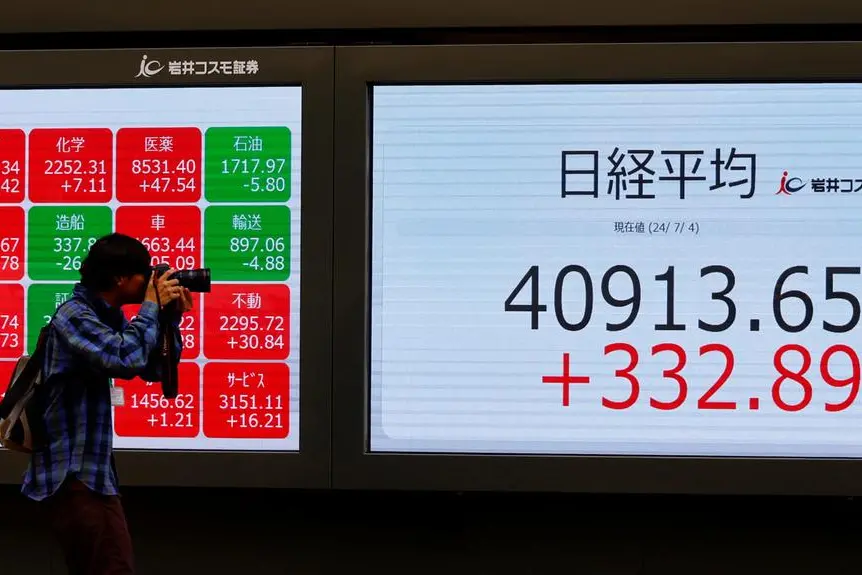PHOTO
LONDON - Stocks sagged worldwide on Wednesday as earnings from Tesla, Alphabet as well as European luxury brands disappointed, while the yen surged to a seven-week high ahead of a central bank meeting next week.
The U.S. dollar was broadly steady, with traders watching out for an inflation reading on Friday and a Federal Reserve meeting next week.
The pan-European STOXX 600 index slipped 0.8% to 512.3 points as of 0800 GMT. That was led by a 2% slump in the personal and household goods sector after the world's biggest luxury group LVMH reported slower sales growth as Chinese shoppers rein in their spending.
MSCI's broadest index of Asia-Pacific shares outside Japan lost 0.4%, while Japan's Nikkei fell 1%.
The dour mood looked set to continue in the United States. Nasdaq futures slid 1% and S&P 500 futures were 0.7% lower after Tesla reported its smallest profit margin in more than five years, weighing on other EV stocks.
"The interim results season is kicking off on both sides of the Atlantic and, so far, investors are underwhelmed by what they have seen," said Steve Clayton, head of equity funds, Hargreaves Lansdown.
Shares of Google-parent Alphabet slipped in after-hours trade even as the firm beat revenue and profit targets.
"Investors queried whether the vast sums being invested into Google's AI capabilities were actually earning a return," Clayton said.
Subdued stock trading globally was symptomatic of markets looking for direction, with traders digesting a range of themes including the U.S. election, expectations of rate cuts, and weak corporate earnings reports.
U.S. GDP data on Thursday and personal consumption expenditure data - the Fed's favoured measure of inflation - on Friday could help investors calibrate their expectations of when interest rates might be cut.
Markets are pricing in 62 basis points of easing this year, with a cut in September priced in at 95%, the CME FedWatch tool showed.
A growing majority of economists in a Reuters poll said the Fed will likely cut rates twice this year, in September and December, as resilient U.S. consumer demand warrants a cautious approach despite easing inflation.
"The U.S. consumer has remained extremely strong ... but you're starting to see a degree of fragility underlying some of the data," said Luke Browne, head of asset allocation for Asia at Manulife Investment Management.
YEN RIDE
The yen spiked to its highest in seven weeks of 154.36 per dollar after surging nearly 1% on Tuesday, having languished near a 38-year low of 161.96 at the start of the month. It was last up 0.56% at 154.73.
Traders are focused on a Bank of Japan meeting next week, where a 10 basis point hike is priced at a 44% chance.
Traders suspect Tokyo intervened in the currency market in early July to yank the yen higher, with estimates from BOJ data indicating authorities may have spent roughly 6 trillion yen ($38 billion).
The suspected bouts of intervention have led speculators to unwind popular and profitable carry trades, in which traders borrow the yen at low rates to invest in dollar-priced assets for a higher return.
The yen was higher against other currencies too, touching a more than one-month highs against the pound and the euro and a two-month high against the Australian dollar.
The dollar index, which measures the U.S. currency against six rivals, was little changed at 104.53. The index is down 1.3% this month.
In commodities, oil prices rose on easing U.S. crude inventories. Brent crude futures for September rose 0.51% to $81.52 a barrel, while U.S. West Texas Intermediate crude for September gained 0.65% to $77.46 per barrel. ($1 = 155.3600 yen)
(Reporting by Lawrence White in London and Ankur Banerjee in Singapore; Editing by Christopher Cushing, Sam Holmes and Edwina Gibbs)




















